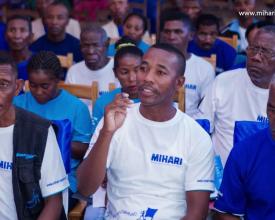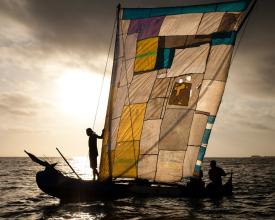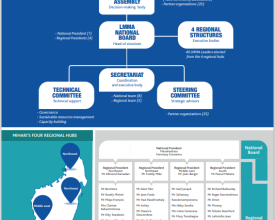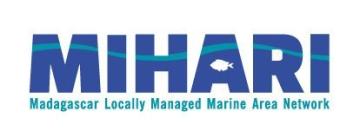
MIHARI, le premier réseau national d'aires marines protégées dans l'océan Indien occidental
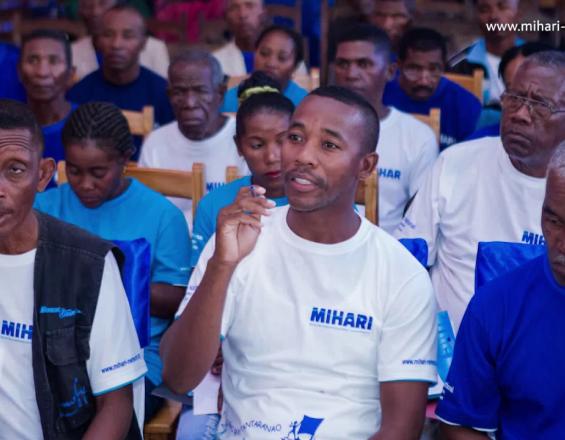
MItantana HArena Ranomasinaavy eny Ifotony - MIHARI, le Réseau des Aires Marines Gérées Localement (AMGL) de Madagascar, a été créé en 2012 à l'initiative de 18 communautés d'AMGL du Sud-Ouest de Madagascar. Depuis, il n'a cessé de se développer et d'évoluer. Le réseau vise à soutenir les AMGL en renforçant le leadership local, en partageant les meilleures pratiques, en garantissant la durabilité financière et en faisant entendre la voix des pêcheurs.
Il est organisé en réseau, ce qui permet une coordination nationale et une mise en œuvre régionale.
Récemment, en 2020, le MIHARI est devenu une entité formelle dotée d'un statut indépendant, qui lui permet de recevoir et de gérer directement des subventions.
Le gouvernement malgache n'a pas encore formellement intégré un décret ministériel LMMA dans sa législation, mais il a été impliqué dans les différents forums et processus de prise de décision du MIHARI.
Contexte
Défis à relever
- Le niveau d'éducation des petits pêcheurs est faible. Cela rend, d'une part, le partage des connaissances lent et, d'autre part, la transmission des informations des chefs de file des pêcheurs aux autres membres de la communauté limitée.
- L'éloignement des communautés de pêcheurs rend la mobilisation très difficile, d'un point de vue logistique, mais aussi en termes de communication, car les villages n'ont souvent pas de réseau téléphonique, et de nombreux pêcheurs n'ont pas de téléphone ou pas de crédits de communication.
- Les LMMA n'ont pas encore de cadre juridique formel.
Emplacement
Traiter
Résumé du processus
Le réseau MIHARI a, d'une part, renforcé la reconnaissance des petits pêcheurs en tant que cogestionnaires légitimes des LMMA et parties aux négociations, grâce à la conception et à la mise en œuvre participatives de sa structure, qui clarifie les rôles, les responsabilités et les mécanismes de reddition de comptes. Mais le réseau et sa structure n'auraient aucun poids ni aucune légitimité si les représentants des pêcheurs eux-mêmes n'étaient pas des leaders actifs pour prendre part aux négociations avec les agences gouvernementales. Le renforcement des capacités dans ce sens a été déterminant. De même, le réseau n'aurait pas gagné en reconnaissance et en légitimité pour représenter les droits des petits pêcheurs dans la cogestion de leurs ressources, si le MIHARI ne s'était pas engagé dès le début avec toutes les agences gouvernementales concernées. L'établissement d'une relation de confiance avec le gouvernement était essentiel pour positionner le MIHARI comme un acteur clé dans le travail politique lié à la gestion des ressources marines, et en particulier dans le développement d'un cadre juridique adéquat pour les AMGL à Madagascar.
Blocs de construction
Relation de confiance avec le gouvernement
Depuis sa création, le MIHARI a toujours impliqué les autorités gouvernementales, au plus haut niveau. Il a rendu visibles les ministères de l'Agriculture, de l'Élevage et de la Pêche, ainsi que de l'Environnement, qui ont été cités comme principaux partenaires, hôtes de conférences, etc. Le MIHARI a également consulté les autorités tout au long des processus, tels que la formalisation d'un guide de référence sur les AMGL, le premier de ce type dans le pays, qui sera, nous l'espérons, intégré à terme dans la loi nationale.
Facteurs favorables
- Les fonctionnaires sont invités à participer à tous les grands forums et à toutes les visites de sites, en tant que sponsors.
- Assurer la liaison et maintenir de bonnes relations avec les représentants du gouvernement, y compris les ministres.
- Collaboration à l'organisation d'événements clés, tels que l'atelier visant à améliorer la gestion des pêcheries de crabes de vase.
Leçon apprise
Il est très important de rencontrer régulièrement les représentants du gouvernement afin de les informer des activités en cours et prévues.
Mise en œuvre de la structure du réseau
En 2015, les consultations entre tous les membres du MIHARI ont débuté afin d'établir une structure claire et fonctionnelle. 45 pêcheurs sont élus pour représenter leur région et se réunissent chaque année au niveau régional ou national. Au cours de ces événements, ils ont également la possibilité d'approcher directement les représentants du gouvernement, ce qui a eu un impact considérable.
Facteurs favorables
- Existence de leaders communautaires motivés et engagés pour contribuer à la gouvernance du MIHARI.
- Formations des pêcheurs depuis la création du MIHARI, qui ont permis l'émergence de leaders.
Leçon apprise
Il était important de mettre en place un processus consultatif pour légitimer les membres élus du conseil d'administration national de l'EMMT.
Renforcement du leadership des pêcheurs
Le renforcement du leadership des pêcheurs élus pour représenter leurs communautés dans les différentes activités du MIHARI est essentiel pour que le réseau existe en tant que véritable mouvement de pêcheurs. Leur confiance en eux pour s'exprimer et leur participation active aux discussions et aux consultations soutiennent et alimentent le partenariat entre les ONG et les communautés des LMMA.
Facteurs favorables
- Renforcement des capacités en matière de leadership, de négociation et de prise de parole en public.
- Le fait que le réseau MIHARI soit une organisation officielle donne aux petits pêcheurs la légitimité nécessaire pour s'engager et participer aux négociations.
- Le fait d'être un représentant élu permet de rendre des comptes à sa communauté.
Leçon apprise
- Les consultations sur les besoins des pêcheurs en termes de formation sont importantes pour fournir les activités de renforcement des capacités adéquates.
- L'apprentissage par la pratique et l'échange entre pairs sont aussi importants que les formations formelles.
Impacts
Opérationnel depuis 2015, le MIHARI est aujourd'hui un mouvement national de pêcheurs artisanaux officiellement reconnu.
Considérés comme marginalisés et pauvres, les pêcheurs artisanaux sont souvent timides et réticents à s'exprimer. Le MIHARI a beaucoup investi dans le renforcement de leurs capacités en matière de leadership, de prise de parole en public, de négociations et de création de partenariats. Il a généré un mouvement de leaders avec des représentants des pêcheurs dans chaque village et LMMA. Ces leaders osent désormais s'exprimer en public, devant les autorités gouvernementales, et prendre part aux négociations. Cela a conduit à l'adoption de trois motions.
MIHARI regroupe 219 LMMA, ramifiés en 10 régions côtières sur 13. Le réseau a permis l'émergence de petits pêcheurs convaincus de l'intérêt de gérer leurs ressources et qui ont adopté leur propre droit coutumier, le dina, pour réglementer leurs activités de pêche dans leur LMMA.
Le MIHARI a également joué un rôle essentiel en incitant les ONG à travailler ensemble. Il a généralement réussi à mobiliser tous les acteurs clés, du gouvernement aux donateurs internationaux, en passant par les associations communautaires et les ONG qui les soutiennent.
L'approche LMMA est l'un des modèles de cogestion des ressources naturelles dans l'océan Indien occidental qui a été largement diffusé grâce au MIHARI. Le réseau a inspiré d'autres pays, au-delà de la région.
Bénéficiaires
- Les communautés des LMMA engagées dans la gestion de leurs ressources
- les ONG qui soutiennent les AMGL.
Objectifs de développement durable
Histoire
Le concept d'AMGL a été développé dans le pays pour renforcer la gestion responsable des ressources par les communautés, depuis 2006. Aujourd'hui, on estime que 17 000 km2 des eaux territoriales malgaches font l'objet de ce type de gestion. Les communautés locales sont déjà reconnues pour leur précieuse contribution à la gestion des ressources marines, mais il n'existe pas encore de cadre juridique qui légifère clairement ces AMGL. Depuis 2015, le réseau MIHARI mène un travail de plaidoyer pour que l'approche LMMA soit légalement reconnue à Madagascar.
Le concept LMMA a émergé comme une réponse pertinente à plusieurs engagements de l'Etat, tels que l'objectif d'Aichi n°11, la Promesse de Sydney pour tripler les AMP et l'ODD n°14 Conserver et exploiter durablement les océans, les mers et les ressources marines pour un développement durable; ainsi que la Politique " Initiative pour l'Emergence de Madagascar " pour assurer la durabilité des ressources côtières et marines pour les générations à venir.
Récemment, en décembre 2020, le MIHARI a invité des représentants de différentes institutions et des acteurs clés de la gestion des ressources marines et côtières à des visites de terrain dans la région de Diana.
Les deux visites ont montré les succès obtenus et les défis rencontrés par les LMMA. Les discussions entre les communautés locales et les représentants des institutions ont mis en évidence les réalisations mais aussi les efforts communs qui doivent encore être faits, tels que le renforcement de l'engagement des communautés locales, l'harmonisation des interventions sur le terrain, et surtout la sécurisation du concept de LMMA.
Suite à ces visites de terrain, des sessions de travail ont été planifiées pour consolider les informations relatives à la gestion des ressources locales. Une analyse des lacunes sur les aspects juridiques est également prévue pour les sites gérés localement, ce qui contribuera au développement d'un cadre juridique adéquat pour les LMMA.
Dans ce processus, il est important de capitaliser tous les mécanismes de gouvernance existants, pour que les différentes approches soient prises en compte dans l'identification de ce cadre juridique, qui garantirait légalement les interventions des communautés locales dans les ressources marines et halieutiques.
Ces activités font partie d'un effort soutenu pour assurer un meilleur avenir aux communautés locales et à leurs ressources côtières et marines bien gérées.
(Adapté et traduit du blog du MIHARI : Ensemble pour décupler l'impact positif des communautés gestionnaires de LMMA à Madagascar - Mihari Network (mihari-network.org)

